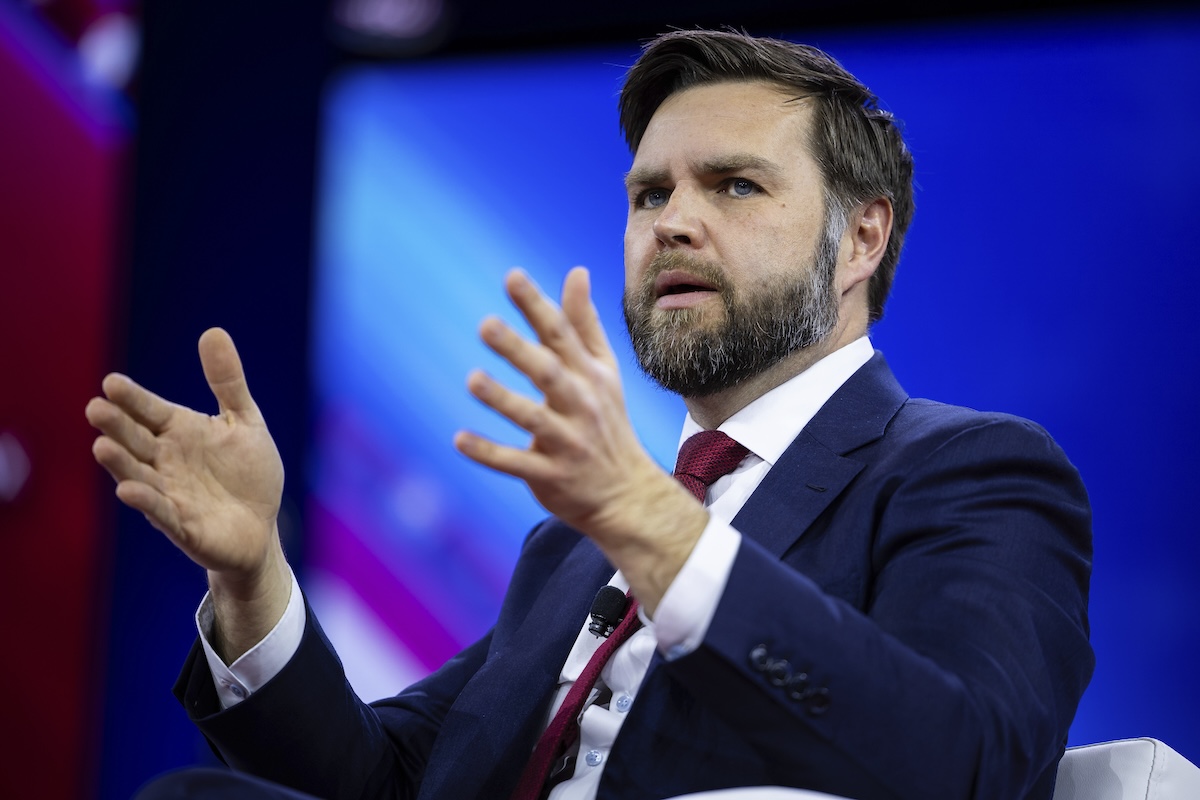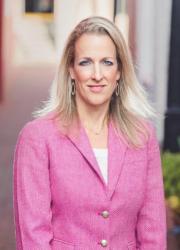The May issue of First Things includes an article by Matthew Schmitz titled, “JD Vance, Religious Populist,” in which Vance is portrayed as perhaps the last hope for the survival of Christianity in American politics and the public square. The article raises important questions: Has Christianity indeed withered from American life, and is the religious right dead? Is politics the best avenue for upholding Christian truths, and is Vance the torchbearer?
Schmitz begins with a discussion of the death of the “religious right,” which had its inflection point in the 1990s during the George H.W. Bush era. This was preceded by the founding of the Moral Majority by Jerry Falwell, a Baptist pastor, in 1976 with a coalition of evangelicals and Catholics who desired to bring conservative Christian principles to Republican politics. They lamented the decline of morality in America and wanted to influence political outcomes to turn the tide. During the 1980s, the Moral Majority and, more broadly, the Christian right nestled inside Republican politics and were most vocal about social issues, including opposition to abortion, gay issues, and the Equal Rights Amendment; advocating for prayer in schools; and promoting ever-nebulous “family values,” which has a multitude of meanings. Moreover, they advocated for free trade and free markets but argued for “foreign-policy interventionism.”
That unique 1980s coalition has since scattered. Schmitz argues that if the religious conservatism of the 1980–1990 period was dying, it suffered its “fatal blow” in 2016 because “religious conservative leaders were among Trump’s most outspoken opponents and a small but loud band of anti-Christian social-media users were among his most outspoken supporters.” A religious populism has since emerged in its place, and with it J.D. Vance. He suggests that Vance can lead a new religious right into the future.
According to a 2005 academic study, religious affiliation is a strong indicator of voting behavior, particularly on issues of abortion, environment, economics, and homosexuality. Gallup polls confirm that religious identity mattered in the most recent presidential election, with Trump scoring a large percentage of White Protestant votes in 2020. In contrast, Catholics were more split between Trump and Biden, who is Catholic. Biden attends weekly mass, and while he refers to his faith as “private,” he publicly claims his Catholic identity. Biden has a picture of Pope Francis in his office, and Trump pedals Bibles at rallies, yielding the chant, “Make America pray again.”
Both Biden and Trump know they must appeal to religious voters, because religious identity matters in the voting booth. This is not to say that their private faith is not genuine or irrelevant, but that they must play to their voters along as many dimensions as possible. This is why Nobel laureate James Buchanan referred to this as “politics without romance.” There is nothing new under the sun, including Vance’s appeal to the decline of Christianity in America and his self-appointment as our political Lord and Savior.
Moreover, Schmitz argues that the religious right has undergone an ideological transformation. “Free trade and open borders are out; economic moderation and immigration restriction are in. Along with a shift in policy, there has been a shift in tone, reflecting a growing sense of alienation.” Long gone are the days when Ronald Reagan, on his last day in office, gave a speech known as a love letter to immigrants, welcoming those who wanted to call America their home and calling for freedom of religion, freedom of speech, and free enterprise. The New Right now consists, among other things, of Catholic and Protestant integralists battling for the soul of America. J.D. Vance is more than happy to be the fearless leader of this populist, and religious, right.
Unironically, and much like Trump, Vance positions himself as an outsider. His wildly successful 2017 memoir, Hillbilly Elegy, sets him up as the tragic hero wading his way out of the working class in rural Ohio. Undoubtedly, he came from a broken home with a troubled upbringing. He speaks of poverty and low-skilled jobs and a family plagued by addictions to drugs and alcohol. His grandmother, Mamaw, gave him the tough love he needed to escape his past and make it to Yale Law School—and now the floor of the U.S. Senate at a mere 39 years of age. He is undoubtedly a success in escaping a past that tends to trap people. This informs how he views the world today, as it would anyone. Yet he sees modern America as having lost its moral and economic compass, and he’s the one to restore it. He views American culture through the lens of socioeconomic class distinctions and worries about income mobility. While some of his diagnoses may be accurate, his policy solutions deserve scrutiny.
He is not the first to recognize these patterns. Sociologist Charles Murray, in his book Coming Apart, goes into great empirical detail to highlight the class schism among white Americans, which he traces back to 1964. Rich white Americans are more likely to get married, are less likely to divorce and have abortions, have higher incomes, are more likely to graduate from high school and college, and are less likely to suffer from drug addictions. He observes the opposite patterns among low-income white families. Marriage is important, and many from across the ideological spectrum agree. It correlates not only with economic gains and more stability but, for Christians, it’s also a sacred institution (for some, a literal sacrament) and the core of the family unit.
Vance’s Mamaw, we are told, disliked the Moral Majority as they gained power. She viewed them as outsiders trying to control politics. This influences how Vance sees the traditional religious right, and thus he embraces a populist response. Vance is quoted in the article saying something we can all agree with: “The core Christian insight of politics is that life is inherently dignified and valuable.” I have yet to meet a sincere Christian from any denomination who disagrees. Yet he uses this to pivot away from free markets toward more economic intervention, which he argues is necessary for higher wages and living standards. He sees these economic interventions as missing from the prescriptions of the traditional religious right.
What if both Mamaw and Vance are right in principle but wrong in practice? Mamaw was onto something in her suspicion of Christian interest groups. Not because of nefarious intentions but because they begin to worship the mantle of political power and view political control as the only mechanism by which we can solve complex social problems. This erodes the Tocquevillian intermediating institutions in America. Alexis de Tocqueville saw these emergent civil organizations as a consequence of religious freedom. Americans solved problems locally by forming organizations like orphanages and hospitals and, in doing so, lived out their conscience in the public square. Those institutions evolved out of personal conviction and duty. The late Michael Novak argued that these virtues are essential to the survival of market capitalism. When the government usurps the authority of institutions that should rest on individual responsibility and subsidiarity, we erode the fabric of civil society and family life.
What if Vance is correct that life is valuable and dignified, but his political approach to fixing these problems, which focuses on “fairness,” gets it all wrong? Vance wants to restrict international trade and the outsourcing of energy production and raise taxes on companies that “export jobs overseas.” He opposes the Nippon Steel acquisition and wants to use the Federal Trade Commission to break up big tech. Yet he complains about the rising prices of consumer goods.
Vance is a big-government Republican, and these policy proposals will not help families, because they will tend to raise prices and reduce entrepreneurship, both of which are bad, particularly for low-income Americans. Restricting trade—whether by taxing imports, trade restrictions, supporting politicized labor unions, or using antitrust to solve the corporate problem du jour—harms citizens by discouraging the best allocation of resources, which means less prosperity and lower living standards than we would otherwise obtain. Vance has partnered with Elizabeth Warren, a populist progressive, to crack down on Wall Street. After the Great Recession, this sells well. But what if, again, he is missing the point? Making it more challenging for banks to merge doesn’t make them better or more competitive. Yet two superpowered elites who want you to believe they are just like you are also arrogant enough to think they know how to fix these problems. They aren’t, and this is not unchartered political territory. Remember the sweeping government response to the Great Depression?
Moreover, Vance pretending he isn’t elite is a bit like Bernie Sanders, who has become a millionaire as a senator, pretending he isn’t rich. It’s more honest and effective to recognize that most Americans grow rich by creating value through commerce. They invent, they innovate, they create. Our worry should be that once they obtain their wealth, they tend to use the political system to advance their interests, a winner-take-all game. This is not an indictment on wealth accumulation but on the expansive Leviathan state.
What if we celebrated value creation and income mobility by removing the barriers preventing Americans from obtaining financial success? Some Americans are indeed stuck in the working class, though they strive to move beyond it. The rich can obtain political privilege, which we should eliminate. For example, we could improve education at the primary level through vouchers and remove subsidies to higher education, making it more affordable, accessible, and of improved quality. This would allow diversification in what higher education offers and will serve more students. Decreasing the costs of higher education would reduce the need for student loans, and privatizing federal student loans would help the most needy student get access to loans and would shrink the massive current default crisis. Hospital services cost 220% more than in 2020, outpacing the overall 74% inflation rate in the same period. These are real problems, and they hit the working class the hardest. Let’s free the healthcare market and the market for higher education. Let’s figure out a prudent solution to Social Security and Medicare, which are unfunded liabilities spiraling out of control. We can remove regulatory frequently advocated for by the wealthy because they shield them from competition. In all this, we can stand for families.
Vance is right to be worried about the decline of Christianity in America and the rise of “the nones,” those without any religious affiliation. He is right to worry about the elites who promise us heaven on earth, both socially and economically, even though he doesn’t see that he is an elite. But can we win culture wars through politics? If we could, should we? The victories will surely be fleeting. It seems that Michael Novak was right: we need a return to virtue, and this cannot be compelled; it must be chosen. There is a prominent role for the church to play. This is the stuff of principle, not populism, and a return to principle is what we need most. Vance does not represent a return to principle.

